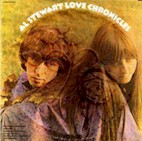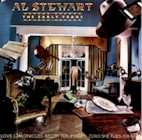
Genre: pop
Rating: 3 stars ***
Title: Love Chronicles
Company: Epic
Catalog: BN
25634
Year: 1969
Country/State: Glasgow, Scotland
Grade (cover/record): VG / VG+
Comments: minor ring wear
Available: 1
GEMM catalog ID: 5805
Price: $12.00
Perhaps because they were looking for another Donovan, in 1968 Stewart found himself signed to Epic Records in the States (CBS distributed his catalog in the UK), which eventually got around to releasing his sophomore album "Love Chronicles". Recorded with a notable cast of guests including Jimmy Page and the bulk of Fairport Convention (listed under pseudonyms to avoid cross-label contract issues), the album was actually scheduled for release in 1968, but ran into a major firestorm in the form of the title track. Serving as extended autobiographical overview of Stewart's love life, 'Love Chronicles' saw Stewart break various taboos by using an obscenity as a verb in describing an act of physical intimacy. You can guess the word. That led to a protracted battle, with Epic management refusing to release the album and Stewart digging in his artistic heels similarly refusing to back down and edit the track. So what about the rest of the album? The title track basically set the theme - Al Stewart as an English stud muffin. Half of the songs seemed to focus on Stewart's sexual conquests. It wasn't exactly a threatening, in-your-face style of obnoxious sexism, rather the results were almost embarrassing - like hearing a buddy babbling on and on about his prowess with the ladies and you know that he's a clueless mama's boy who would run at the sight of a hot woman ... Musically the album also marked a change. Whereas "Bedsitter Images" surrounded Stewart with heavy orchestration, this time out the results were stripped down, with Page and his Fairport buddies giving several tracks a distinctive rock edge. We're not talking Zeppelin here, but far heavier than the debut.
- 'In Brooklyn' served to frame the album's sometimes weird mixture of singer/songwriter folk moves and rock touches; notably Page's screeching electric guitar. Lyrically the song focused on Stewart's luck bedding American fans - for better of worse his sex life came up in quite a few songs on this set. rating: *** stars
- Starting off as a more conventional singer/songwriter number, 'Old Compton Street Blues' could have been a Donovan tune. An indication of the storyteller direction he'd pursue in a couple of years, the plotline centered on a wannabe film star who ends up pursuing a somewhat less desirable career path. About halfway through Page and company kicked in (Page turning in one of his best leads), giving the song a distinctive bluesy feel. For what it was worth, Stewart sounded like he was singing with a cold. rating: *** stars
- Divided into two distinct segments, the first part of 'The Ballad Of Mary Foster' found Stewart taking potshots at the English middle class, while the second part focused on the mom who'd given up her dreams and settled for a life of safety and comfort. The song was heaven made for English and psychology majors. Way too sensitive and insightful for my tastes, it ran on for over eight minutes. You'll either want to cry for the main character, or want to scream at her for not taking charge of her pathetic life rating: ** stars.
- 'Life and Life Only' offered up another stab at the English middle class, this time out it was the foibles of a school teacher cheating on his equally pathetic wife. Framed with one of the album's heavier arrangements, it wasn't a particularly uplifting or cheerful selection, though Page turned in another nice performance. rating: ** stars.
- The most mainstream and commercial song on the album, 'You Should Have Listened To Al' had a likeable Byrd-ish folk-rock feel that could have garnered some attention as a single. A relief from the album's somber feel, it was my favorite performance. rating: **** stars.
- The autobiographical title track served as an extended overview of Stewart's love life; literally detailing every girlfriend the singer ever had - graduate students have written papers with fewer words than he packed in here (by one count there were almost 1,400 words). Stretching over 18 minutes, there were a couple of funny segments ("missing the bus, walked twelve miles home and it didn't seem far"), but overall it quickly became pretty dull and even the combination Page's lead guitar and the appearance of the naughty word (which didn't show up until around minute 16), couldn't save this one from becoming boring. I imagine most folks had tuned out before they heard the bad word and even if you heard it, Stewart's use of the verb came off as surprisingly sensitive ... kind of a letdown given all the hype, though I'm writing this in an age when most CDs carry parental warning labels. rating: *** stars
This was attracts high praise from the Stewart faithful, but to my ears it hasn't aged all that well, and there's something slightly unsettling about seeing that much of the man's personal life. Call me a prude ...
In the UK the album generate widespread praise, including Melody Maker magazine's selection as 1969 "Folk Album of the Year". In contrast, after all of the commotion around the title track, the album was released to complete indifference in the States, quickly ending up in cutout bins, making it a semi-collectable today.
"Modern
Times" track listing:
(side 1)
1.) In Brooklyn (Al Stewart) -
2.) Old Compton Street Blues (Al Stewart) -
3.) The Ballad Of Mary Foster (Al Stewart) -
4.) Life And Life Only (Al Stewart) -
5.) You Should Have Listened To Al (Al Stewart) -
(side
2)
1.) You Should Have Listened To Al
(Al Stewart) -
2.) Love Chronicles (Al Stewart) -
In case anyone cared, the original English release had a different cover (same track listing):

CBS catalog number 63460
The album's seen a couple of reissues. The Collector's Choice package (catalog number 07662) included three forgettable previously unreleased tracks:
1.) Jackdaw (Al Stewart) - 3:20
2.) She Follows Her Own Rules (Al Stewart - Peter White) - 3:18
3.) Fantasy (Al Stewart) - 2:15
reviewed SRB 8/2009


 .
.



